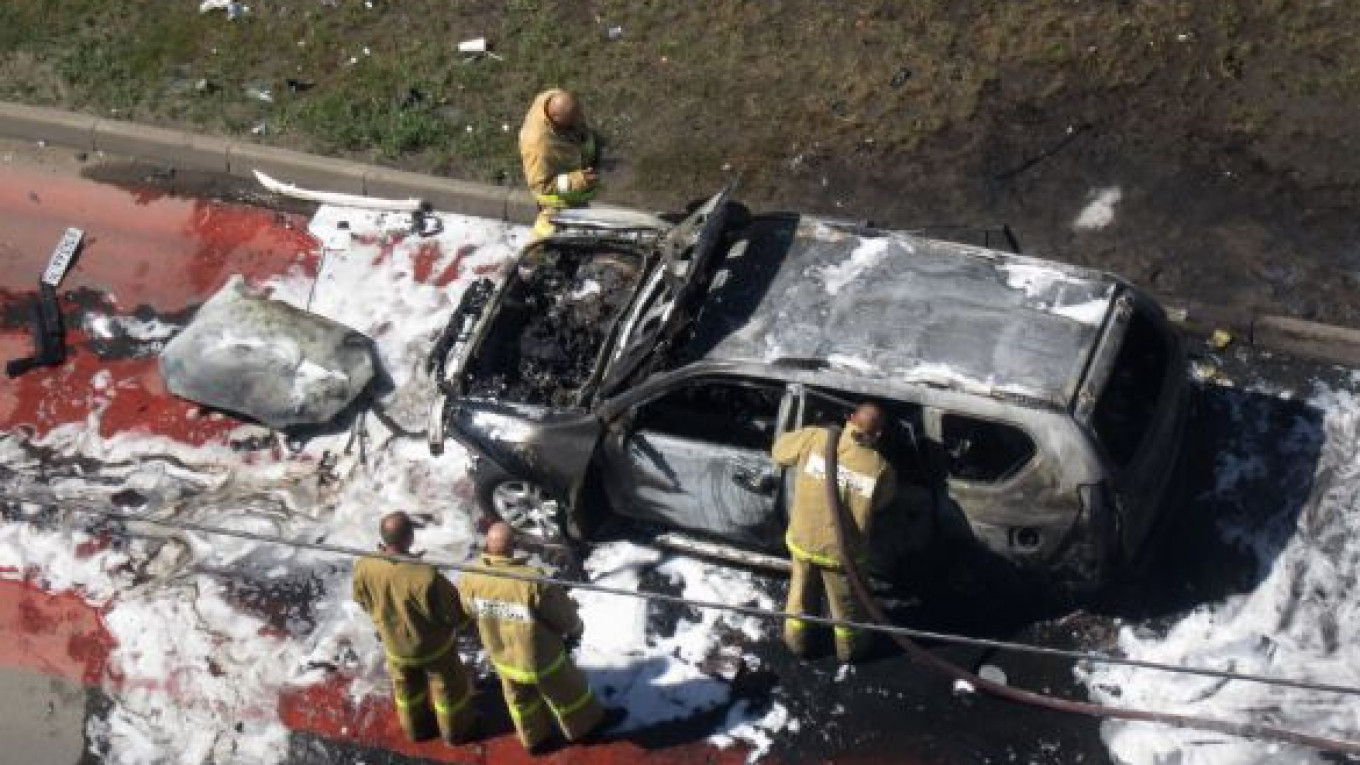In the first major attack against religious leaders outside the North Caucasus, Tatarstan’s top Muslim leader miraculously survived three bomb blasts that destroyed his car in Kazan on Thursday just minutes after gunmen killed his former aide.
The apparently coordinated attack, a day before the start of the holy Muslim month of Ramadan and a major anti-terrorism exercise by law enforcement in Kazan, raised fears that Islamic radicalism has spread to the more secular Muslim regions of central Russia.
The first attack occurred at 10:30 a.m., when gunmen fired at Valiulla Yakupov, a prominent cleric who headed Tatarstan’s Spiritual Board of Muslims education department.
Yakupov was leaving his house when he was shot. He managed to reach his car, where he died of his injuries, the Investigative Committee said in a .
Police later found six shell casings at the site of the shooting, they said in a .
Only 30 minutes later, three bombs went off in the SUV of Chief Mufti Ildus Faizov, police said. (Earlier reports said an hour elapsed between the attacks.)
The explosives had been placed under the passenger seat, and Faizov survived likely because he was driving the car himself, local news site tatar-inform.ru reported.
“I heard about the attack on Valiulla Yakupov and stopped at a traffic light to make a call,” the mufti in remarks released by Tatarstan’s presidential press service. “When I felt the first weak explosion, I immediately tumbled out of the car. It was good that I hadn’t buckled up.”
A video online showed the car’s fuel tank exploding while firefighters tried to put out the blaze.
Tatarstan President Rustam Minnikhanov visited the spiritual leader in the hospital, where he was treated for non-life-threatening injuries, including two broken legs.
In an interview with Channel One television, Minnikhanov indirectly blamed Islamic militants for both attacks.
“The leaders of our spiritual board had a policy of traditional Islam. There are other tendencies, and what happened today is a clear challenge,” he .
Police believe that the attacks were coordinated, and the Investigative Committee said late Thursday that it is treating both cases as terrorist acts, Interfax reported.
Local media reported that police are looking for two suspects. They were identified as Airat Sharipov and Ruslan Tokranov, the Vechernyaya Kazan daily reported on its website late Thursday, citing an unidentified law enforcement official.
Observers said Faizov and especially Yakupov had been declared enemies of Muslim fundamentalists, who promote a puritanical form of Islam known as Wahhabism, which has spread in the North Caucasus since the wars in Chechnya.
“Valiulla was very anti-Wahhabi. His death is a very strong blow to the traditionalists,” said Alexei Malashenko, an analyst at the Carnegie Moscow Center.
No one claimed responsibility for the attacks immediately.
Little-noticed for years, the presence of radical Islam in the Volga region came to the fore in 2010, when the Federal Security Service raided suspected Islamist militants in Ufa, the capital of Bashkortostan, which neighbors Tatarstan.
The raid to the subsequent capture of Bashir Pliyev, an Ingush linked to Shamil Basayev, the late Chechen rebel leader. A string of moderate Muslim clerics have been killed in the North Caucasus over the past two years.
But no senior clerics had been targeted by fundamentalists elsewhere in Russia.
Faizov was also seen as anti-Wahhabi. He was formerly in charge of the spiritual board’s information department.
His 2011 election to the post of mufti was described in national media reports as the forced replacement of Tatarstan’s long-standing Mufti Gusman Iskhakov because of an alarming rise in Islamic radicalism.
Faizov had been expected to lead a campaign against the radicals.
Irek Murtazin, a Kazan-based blogger and former television executive, noted that Thursday’s attacks occurred just a day before local security services had planned a large anti-terrorism exercise in Kazan.
“The whole city was teeming with police already on Thursday, and yet these attacks happened,” he said by telephone. “The intelligence services failed completely.”
Local police described the planned exercise on their website, saying that mock saboteurs would ask citizens for shelter and try to buy large amounts of chemicals in drug stores.
Police citizens to call if they encountered any suspicious persons.
A Message from The Moscow Times:
Dear readers,
We are facing unprecedented challenges. Russia's Prosecutor General's Office has designated The Moscow Times as an "undesirable" organization, criminalizing our work and putting our staff at risk of prosecution. This follows our earlier unjust labeling as a "foreign agent."
These actions are direct attempts to silence independent journalism in Russia. The authorities claim our work "discredits the decisions of the Russian leadership." We see things differently: we strive to provide accurate, unbiased reporting on Russia.
We, the journalists of The Moscow Times, refuse to be silenced. But to continue our work, we need your help.
Your support, no matter how small, makes a world of difference. If you can, please support us monthly starting from just $2. It's quick to set up, and every contribution makes a significant impact.
By supporting The Moscow Times, you're defending open, independent journalism in the face of repression. Thank you for standing with us.
Remind me later.


